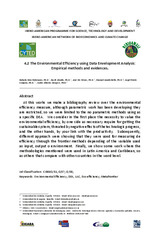Mostrar el registro sencillo del ítem
La eficiencia ambiental mediante Análisis Envolvente de Datos: Métodos y evidencias empíricas
| dc.contributor.author | Alcaide, David | |
| dc.contributor.author | Diz Pérrez, José | |
| dc.contributor.author | Jurado Bello, Manuel | |
| dc.contributor.author | Prieto Guijarro, Ángel | |
| dc.contributor.author | Zúniga González, Carlos Alberto | |
| dc.contributor.author | Dios Palomares, Rafaela | |
| dc.date.accessioned | 2017-03-31T11:22:48Z | |
| dc.date.available | 2017-03-31T11:22:48Z | |
| dc.date.issued | 2014 | |
| dc.identifier.uri | http://hdl.handle.net/10396/14671 | |
| dc.description.abstract | At this works we make a bibliography review over the environmental efficiency measure, although parametric work has been developing they are restricted, so we were limited to the no parametric methods using as a specific DEA. We consider In the first place the necessity to value the environmental efficiency, by one side as necessary require for getting the sustainable system, threated by negative effects of the technologic progress, and the other hands, by your link with the productivity. Subsequently, different approach were showing that they were used for measuring de efficiency through the frontier methods depending of the variable used as input, output o environment. Finally, we show some work where the methodologies mentioned were used in Latin America and Caribbean, so as others that compare with other countries in the word level | es_ES |
| dc.description.abstract | En este trabajo se realiza una revisión bibliográfica sobre la medida de la eficiencia medioambiental y, aunque se han desarrollado trabajos en el ámbito paramétrico, son muy escasos, por lo que nos limitaremos al uso de métodos no paramétricos, concretamente a DEA. Se plantea en primer lugar la necesidad de valorar la eficiencia medioambiental, por un lado, como requisito necesario para conseguir la sostenibilidad del sistema, amenazada por los efectos negativos del progreso tecnológico y, por otro lado, por su relación con la productividad. Posteriormente, se exponen los distintos enfoques que se utilizan para la medida de la eficiencia mediante métodos frontera dependiendo de qué variables se incluyen como inputs, outputs o variables de entorno. Finalmente se presentan algunos trabajos en los que se han aplicado las metodologías descritas en el ámbito exclusivo de América Latina y Caribe, así como otros en los que se han comparado con otros países a nivel mundial | es_ES |
| dc.description.sponsorship | Programa Iberoamericano de Ciencia y Tecnología para el Desarrollo (CYTED) y Red Iberoamericana de Bioeconomía y Cambio Climático (REBICAMCLI) | es_ES |
| dc.format.mimetype | application/pdf | es_ES |
| dc.language.iso | spa | es_ES |
| dc.publisher | Editorial Universitaria UNAM | es_ES |
| dc.rights | https://creativecommons.org/licenses/by-nc-nd/4.0/ | es_ES |
| dc.source | En: Estado del arte en la bioeconomía y el cambio climático (2014) | es_ES |
| dc.subject | Environmental efficiency | es_ES |
| dc.subject | DEA | es_ES |
| dc.subject | LAC | es_ES |
| dc.subject | Eco efficiency | es_ES |
| dc.subject | Metafrontier | es_ES |
| dc.subject | Eficiencia medioambiental | es_ES |
| dc.subject | Ecoeficiencia | es_ES |
| dc.subject | Metafrontera | es_ES |
| dc.title | La eficiencia ambiental mediante Análisis Envolvente de Datos: Métodos y evidencias empíricas | es_ES |
| dc.title.alternative | The Environmental Efficiency using Data Envelopment Analysis: Empirical methods and evidences | es_ES |
| dc.type | info:eu-repo/semantics/bookPart | es_ES |
| dc.rights.accessRights | info:eu-repo/semantics/openAccess | es_ES |

